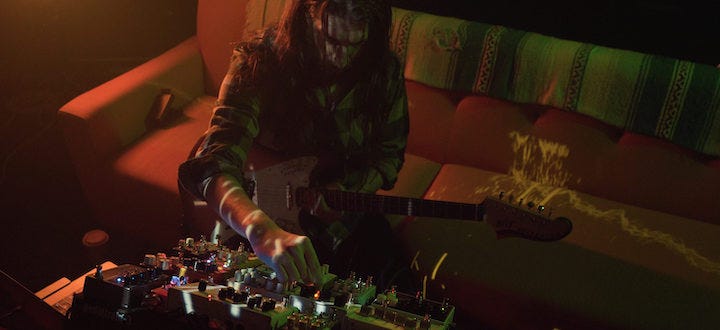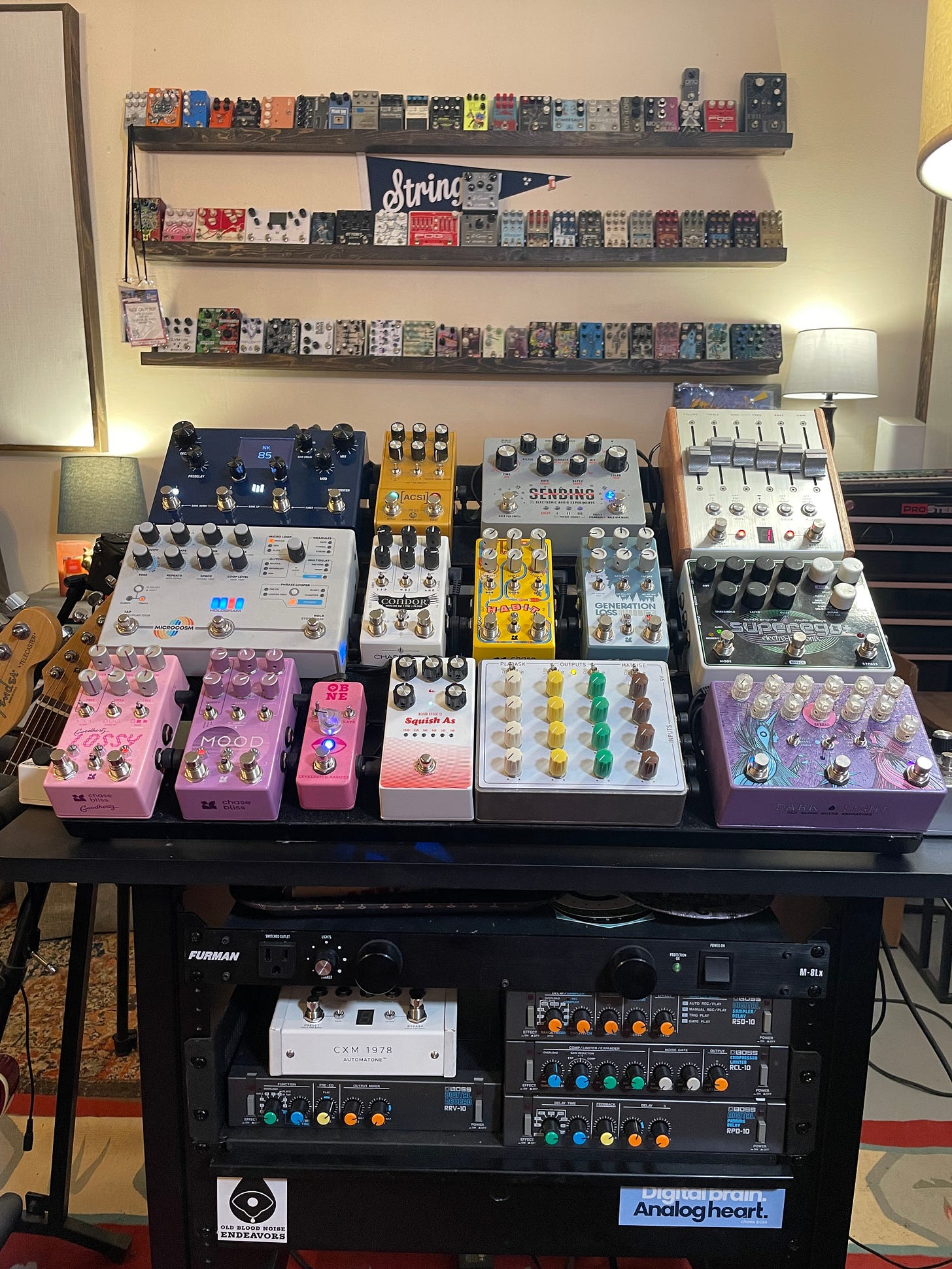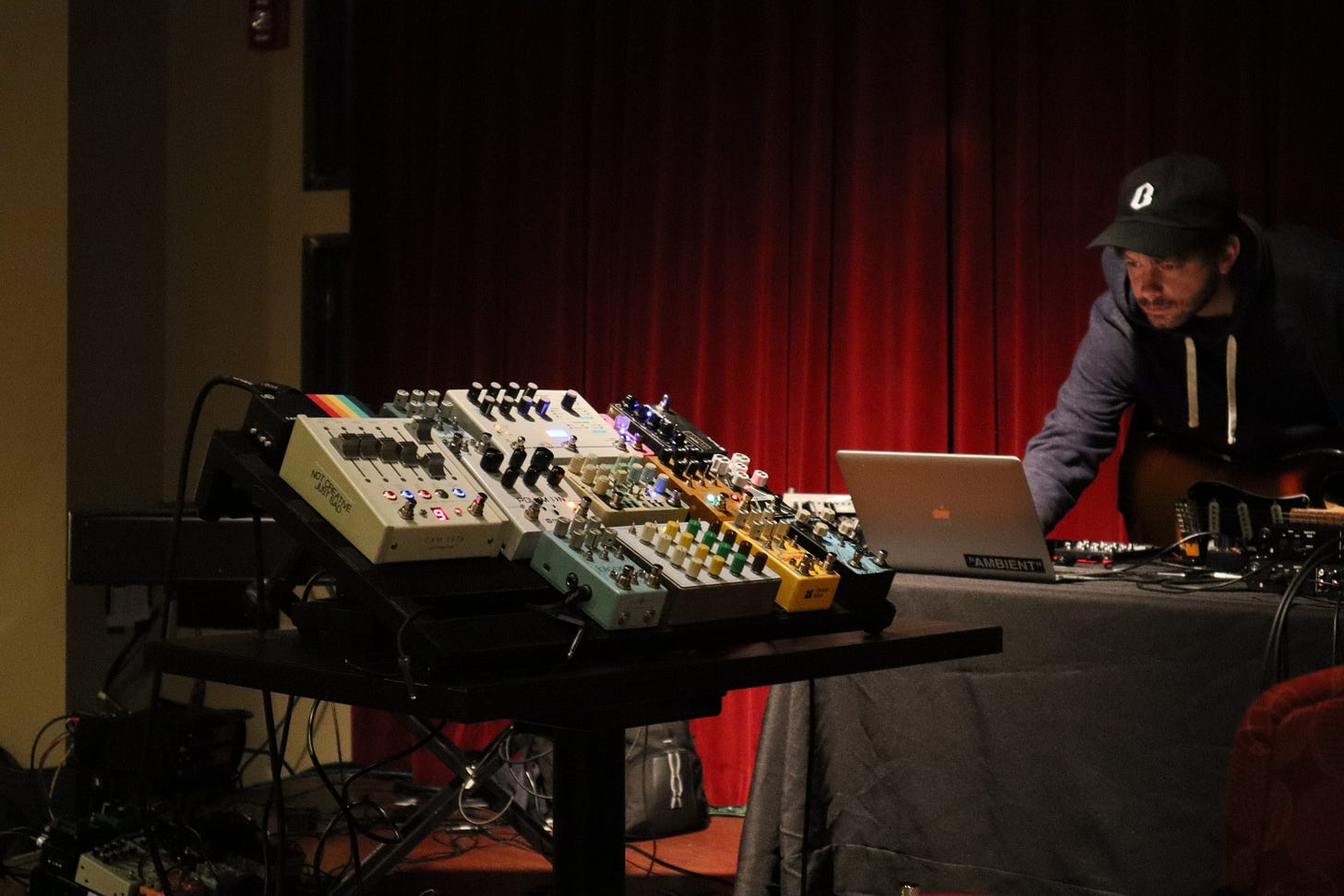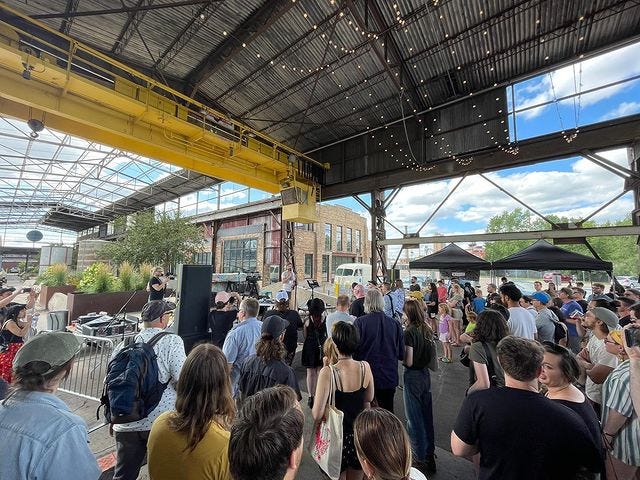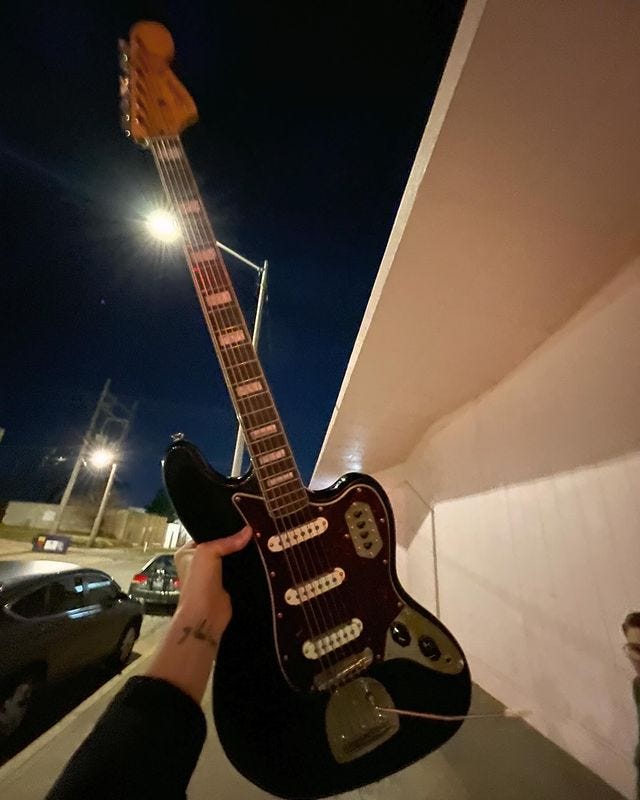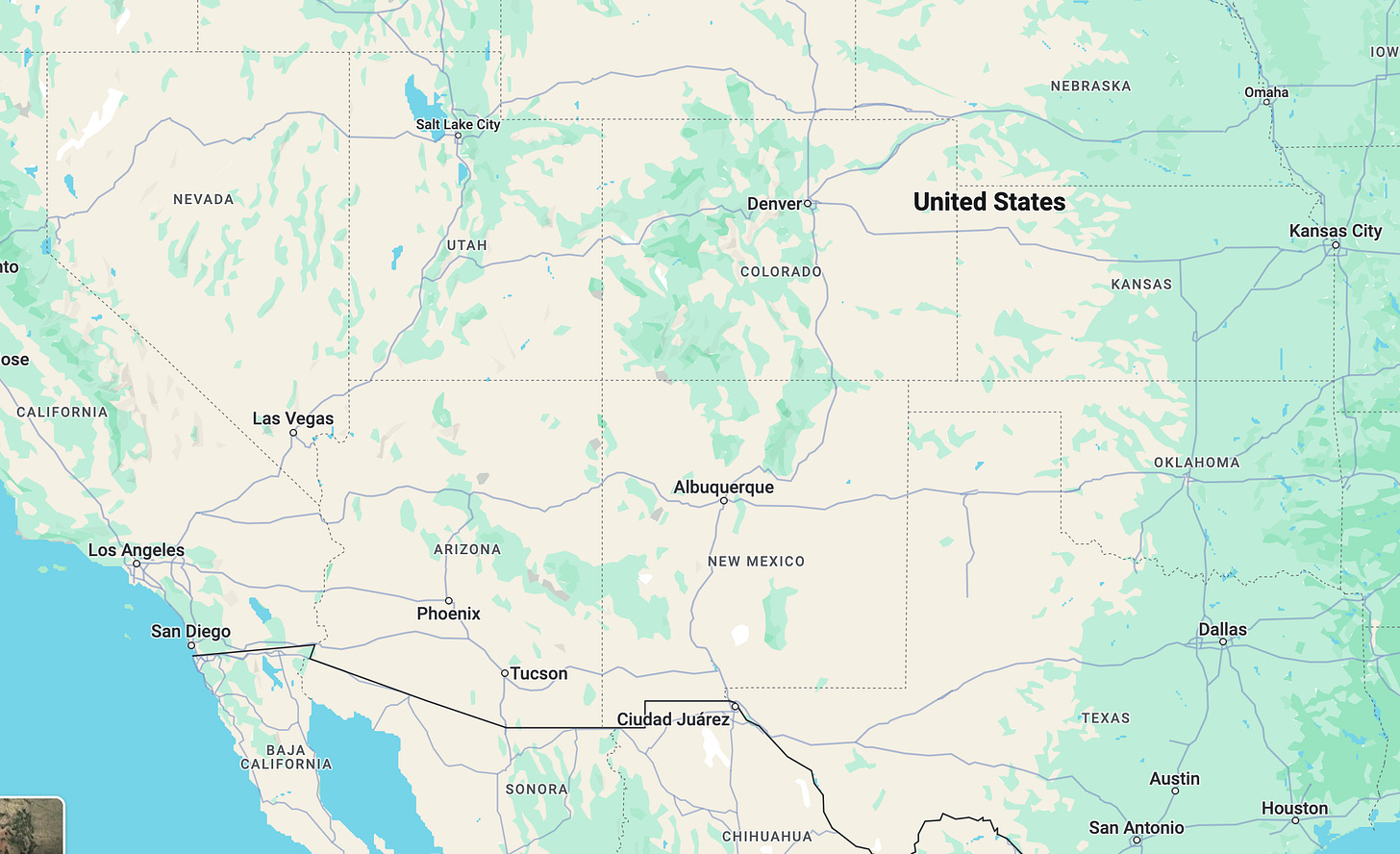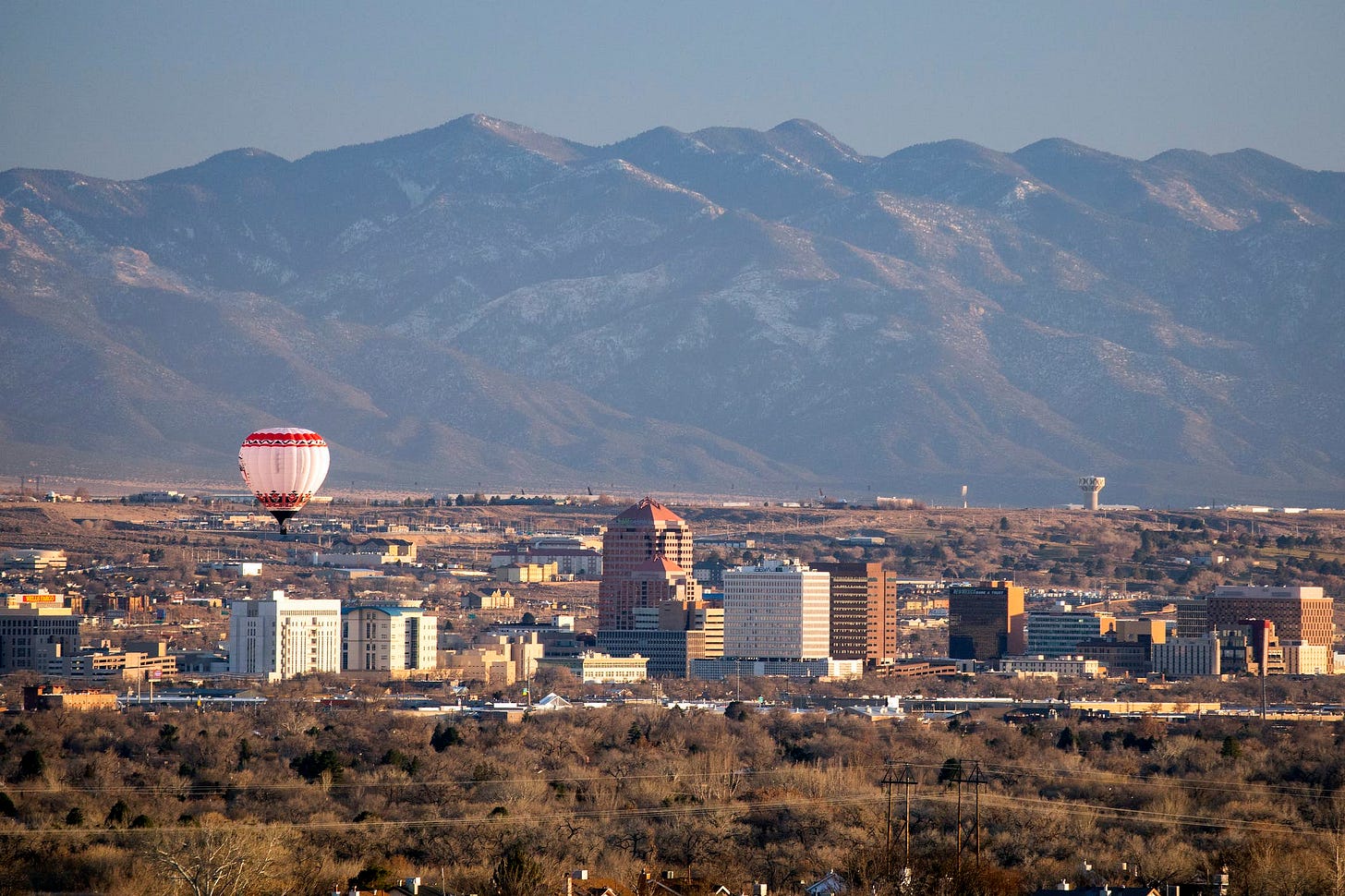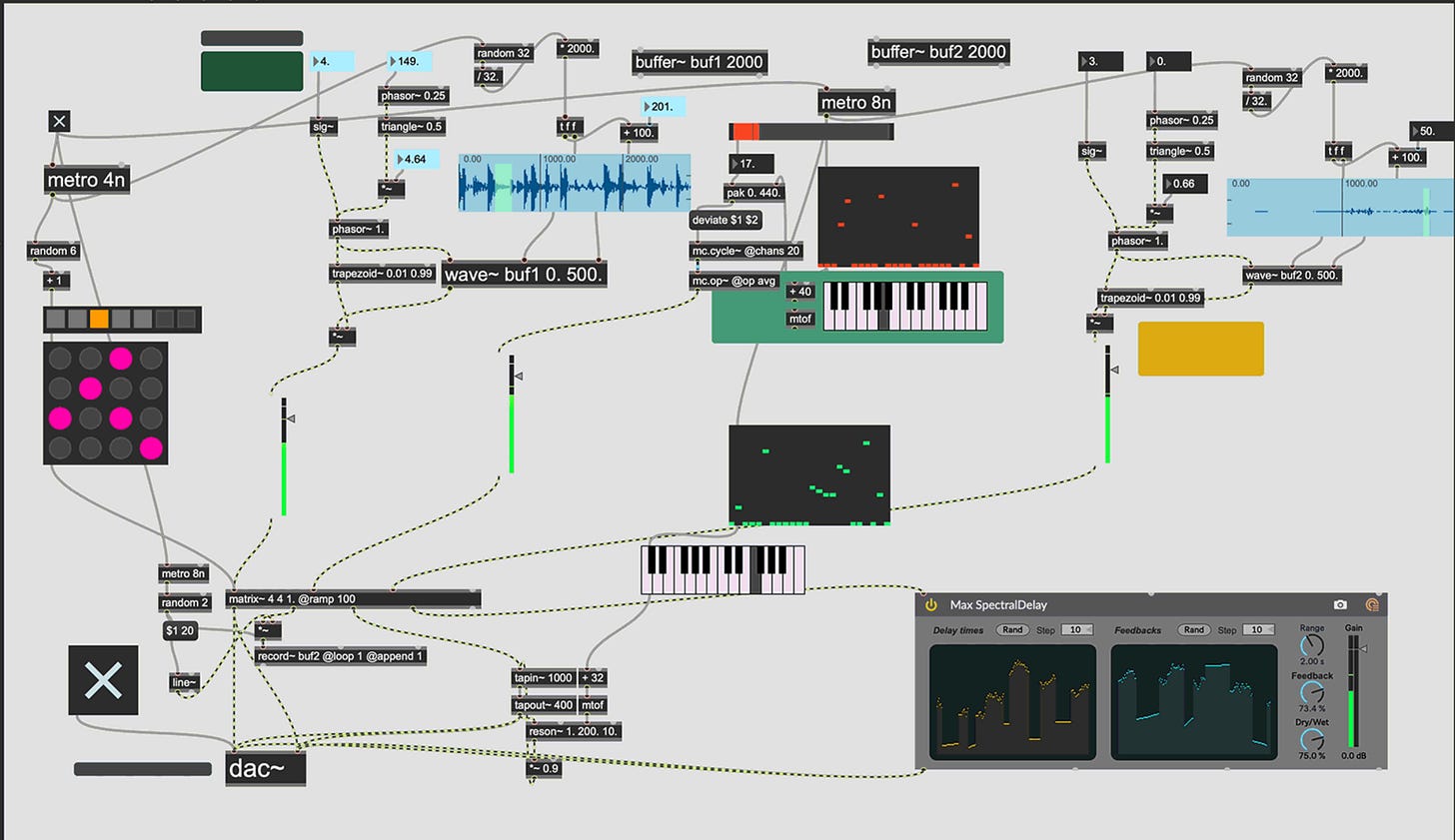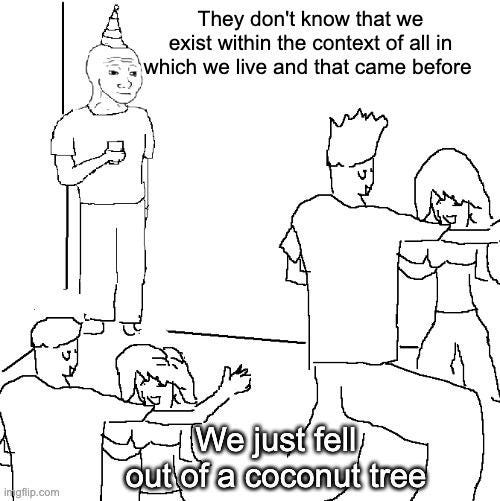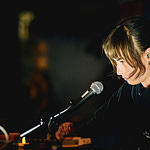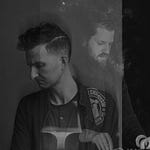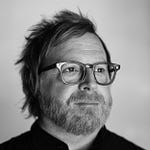I can remember a time in the mid-2000s when the internet wasn’t totally horrible, but was starting to turn a little bit. Despite the ominous signs, there were still a few fun places to hang out, and at least some opportunities to interact with people in a respectful, civilized way. You could actually make friends out there, if you wanted to.
That’s how I met Andy Othling: online, in the mid- to late 2000s, in a somewhat tolerable guitar gear forum that hadn’t been totally ruined yet, with a bunch of other guitar pedal nerds. We kept in touch and became IRL friends.
Since then, we’ve toured together all over the country (including both coasts and the midwest), which has resulted in inevitable hearing loss from blasting OG Maco and Stray From the Path at obscene volumes in the car on the way to venues. He was at my wedding in 2016, mere weeks after one of those tours. We went to Great American Beer Festival in Denver together, and somewhere on Apple’s iCloud servers, there’s a really embarrassing video of us in the middle of a passionate debate after a night out in New Orleans. I feel lucky to know him and call him a friend.
Sappy sentimentality aside, Andy is a phenomenal musician who has spent the better part of this century carving out a unique lane in ambient guitar playing and inventive use of effects pedals. His YouTube videos from years gone by have garnered literally millions of views, but he’ll be the first to tell you about just how problematic and stress-inducing that has been for him, and how much it doesn’t reflect his current creative practice. But when I consider it a little longer, I really believe that kind of reach speaks to how powerful his music can be. Touring with Andy is such a fun experience in part because of this; it’s amazing just how many people come up to him after a show to thank him for the inspiration he’s offered them.
Andy is a remarkably approachable and open book, too. He’s been brutally honest about his mental health struggles in the last few years. I really admire the way he has gone about his healing process, coming to a place of acceptance with many aspects of his life. His honesty, humor, and unpretentious nature is so, so refreshing in a genre like this, which can be prone to people taking themselves and their art a little too seriously sometimes. You can hear him talk about and hint at some of these bigger themes in his life during our interview.
I was so glad to have the chance to sit down with him for this podcast. I didn’t get to touch on so many additional things that I wanted to ask him, but hopefully we can do it again sometime.
Here’s my interview with Andy Othling, who I spoke with over videoconference at his home in Albuquerque, NM, on the night of Thursday, February 15. The transcript follows below.
Be sure to follow and support Andy’s work on Bandcamp, Patreon, and YouTube.
Transcript
Sound Methods 003: Andy Othling
Andrew: Hey there, and welcome back to Sound Methods. My guest on the podcast today is Andy Othling, one of the most creative guitar players I know, and also one of my oldest musical friends. I first met him through direct messages and private chats on guitar gear forums way back when, and that led to an in-person friendship. We've toured together all over the country, and featured in each other's music many times over the years.
Andy makes music under the name Lowercase Noises, and you've probably seen one or two of his “Ambient Sketch” videos on YouTube from years gone by. These days, though, most of his work occurs off camera. He's taken on a variety of roles in product design and consulting, if you want to call it that, for Old Blood Noise Endeavors, Chase Bliss Audio, and more. He continues to release music, as well, and recently issued a beautiful collaborative record with our mutual friend Dave Mantel, who records under the name Naal.
Andy's workflow is centered around heavily processed guitar. Looping, resampling, and all kinds of additional treatment occurs through a MIDI controlled pedal board that is as much an instrument itself as the guitar that he plays. We talked extensively about what led him to this workflow, what he's done in recent years to remove barriers to creativity and enjoyment, and his next steps with visual programming and projection mapping.
Without further ado, here's my interview with Andy Othling.
Andrew: All right, Andy Othling. Welcome to Sound Methods. Thanks for being here.
Andy: Thank you for having me, Andrew.
Andrew: It’s a pleasure. We go a long way back…I don't remember how long we've known each other at this point. Probably at least ten years?
Andy: I feel like it's longer than that. We’re like, “internet people.” It's so wild. An internet friendship that turned into far more.
Andrew: Yeah, those old “Gear Page” interactions…that’s, wow, a blast from the past. So, it was hard to prepare for this. I was trying to think of what I could possibly ask you to make it interesting and not seem forced, but I'm going to try, so bear with me.
Andy: It'll be good. As long as we get to talk at least a little bit about the first tour we did together…we have to go there at least a little bit.
Andrew: That is on my note sheet, so we will definitely talk about that.
Before we started recording, we were talking to our friend - talking about our friend Dave [Mantel], who's there in the room with you, and that's actually where I wanted to start the conversation here because you guys recently released a full length album called “An Encounter with Broken Time.” And there are multiple questions I want to ask about this, so bear with me. I'm going to try to get them all out here.
Can you talk a little bit about the themes and the motivation, and the thoughts behind the album? What does that title mean, specifically? That is one thing I want to try to wrest out of you. What was the thought process that went into that effort?
And then the additional, extended part of this question here is that, I think if I'm not mistaken, this is your first album that you've released under your Lowercase Noises moniker in four years now. I think the last one was 2019, if Bandcamp is accurate. And so I can sense that you’ve - and correct me if I'm wrong, maybe you can elaborate on this, but I think you've pulled back a little bit from that traditional album release cycle thing. I know you were doing some streaming for a long time, and you were doing a little more unconventional ways of presenting your music.
So, the second half of the question is: I’m wondering if you can elaborate on how you're approaching releasing your music these days, and what has changed for you and your thought process behind it?
Andy: Yeah, there's a whole lot there. I mean, talking about all the things that changed after 2019 is like, “yeah, a lot of stuff happened immediately after 2019!” And I was even thinking before this just how much has changed, especially since I've gotten to know you, like you mentioned, and 2020 being the literal year [it was] and even the figurative turning point for so, so many things in life.
The thing I was thinking about before this recording is that I can't really talk about music anymore without talking about pretty much every other facet of my life; there is no longer any boundary. If we're going to talk about music, we're going to talk about mental health, and we're going to talk about real world parenting stuff, which you are very new to. And having four kids that were in school at the time of COVID was one of the hardest things I've had to do in my entire life. So that's all sort of, I guess, a precursor.
But I mean, the main thing to answer your question is, I just plain don't have the energy for it…I mean, I just did release an album, but to put together all the material for an album and say, “here I am to release it.” I was [only] able to do it with Dave because he was physically here, literally here in this room. So the impetus for that was basically, “it'd be silly if we didn't do something, because we can't really give ourselves any easier way to do this than to be physically living right here.” So, that that gets you over a lot of hurdles. There's no waiting on an email or a Dropbox upload or something. It's like, “we are just right here doing this thing.”
So that that's part of it, but flipping back to the bigger picture…how far out do I want to zoom? I mean, ultimately what 2020 did to me overall was [get me to] say, “I want everything to get back to its core thing.” And all of this is under the framework of what I would say is pretty severe burnout for myself, so with this meager amount of energy I do have, I'm not trying to fuck around with it. I don't want to do something that is even remotely unpleasant. Whatever parts of this process I don't like, if I can remove those completely, I do that. If not, then I figure out what it takes to make that amenable to any amount of work, any amount of effort. And that also means just, you know, “system” stuff like desk set up, having to focus a lot on what environment I walk into, what can I do within just a few clicks or presses, and do I have to plug stuff in or not?
So all that to say, in terms of ambient stuff, I find myself moving much more away from a traditional compositional approach of songwriting, and thinking about trying to get to the root of the thing. What I like about that process is obviously my musical input to the thing, but then the processing of the thing. So the after the fact - you know, when you're making an album, that means mixing, that means a lot of things that aren't that fun. But my brain really enjoys that process to an extent, so kind of where I've come to now is a place of admitting to myself, like, “guitar pedals are my thing.”
I will say this momentous thing on your podcast; this is an exclusive announcement: breaking news. I like guitar pedals.
Andrew: I think we're all stunned to hear that.
Andy: Yeah, people are just going crazy. TMZ outside. But given that there are a lot of things around - things I would push back against - the pedal industry, or what it meant to be like a “pedal guy” versus a “music guy,” again, I don't have these sort of boundaries between things anymore. I used to, but it’s really…to say it quickly is, [I’m] taking things that I would do in my DAW, in Logic, or with certain plugins and just saying, “what if I could do that before it even hits the computer, so that I don't have to do it on the computer?”
And really it's just a matter of getting to a point where I'm like, “yeah, that thing I want to do? There's a couple of different ways I could do it. But what's the most fun?” And there's no other qualifier than that. And like this [gestures to pedalboard], the pedals and stuff, again - it's not just the pedals, it's friendships I've gained with people in the industry. I know most of the people who make most of the things on my pedalboard, and I have actual relationships with them…and that's just insane. So a lot of it has turned into more than one thing.
The other part of it is the generative or autonomous part of it, where I've separated out [parts of my playing]: “I'd like to play a little bit into my looper, which is in front of all these pedals, and then spend the rest of my time focusing on what kinds of crazy things I can do here to completely obliterate the loop I made, and have it come back together as something cohesive, not only musically, but sonically.”
It's got some EQ in the right places. It's got some compression and loudness stuff going on. And there's stuff happening through my interface, virtually, such that when it gets into the DAW, it's like - if I didn't want to, I I could not touch it at all.
Hopefully that's the long answer to your question.
Andrew: Yeah, that's great. I think it kind of…because the album, for the uninitiated…
Andy: Oh, yeah. I didn't talk about the meaning. We can go into that.
Andrew: Yeah, and definitely feel free to jump in and add to what I'm about to say here, but listening to it, it does feel more… “present.” It really sounds to me - and as someone [who has] toured with you multiple times and seen you play and the way that you do things, to me, it feels like you in the room. There's a little more immediacy to it. There's less - and this isn't meant to be a slight or anything - but it feels like there's less production behind it, and it’s a more authentic kind of a product, at least to my ear. I don't know if you would agree with that.
Andy: Yeah. I mean, I do, completely. And that's intentional. You know, when Dave and I were thinking about what to do, I was just coming into it with the same - and I've been coming into pretty much everything in my life with this…whatever this is, this mindset of like, “well, given what I know about myself, and Dave knows about himself, what can we actually do with our energy levels and what would be the most fun?”
So, I was leaning into the processing part, where it's like the one thing I just said. And we did this all over the record: just sampling into that Primal Tap plugin.
Messing [around[, you got four - or three - other octave ranges to check out there. You can shorten it, lengthen it, add a warble to it…I do that all over the place on that record, and it's…I mean, what ends up happening, or at least what happened for us, when we opened up and when we basically told ourselves “it's okay,” there's sounds on that record that are - you're hearing the fourth sampling of it.
[There are parts that were] recorded that were then put into Primal Tap, that was sampled, but then repitched and put into a VSS 30, and then back out. It's the most “mysterious” process I've ever done, meaning that I can't go back and be like…I can't rigidly say, “this is exactly what we did.” Sometimes things would be like, “what would be the worst thing to do to this?” As a joke, “wouldn't it be crazy? It seems to sound better as we bring this thing down; go an octave down…well, that seems to get better, but let's try 4 octaves up, just to see something that’s the exact opposite of what is happening. That’s good!”
And as you seem to key in on there, there are many, many things in those songs that are just like, “oh, that was some automation I didn't know was there.” There's one part where Dave was like, “oh, can you mess with the modulation on the Primal Tap while it's recording?” And I'm like, “yeah, I think so.” And I fuck with the knob, that [real time change] is in there. We would move it and place that stuff so that it would actually sound somewhat fitting. There are a lot of things like that on that record.
Andrew: Yeah. I love that. It definitely comes across; as someone who's listened to your music for a long time now, it does feel like that for sure.
And that takes me into another point that I wanted to segue into with the next question, is that I can remember…I mean, I can remember listening to your early stuff, and it's really beautifully arranged and sounds like a really beautiful “product,” you know?
And then when we did our tour together in December of 2022, we did those couple of shows and instead of that material, you did improvised live sets every night. And I remember talking about this as it was happening, in the van and stuff, but everything was improvised. I know you had the scripted AI voice that was running as part of that, I think that might have been the only pre-considered part of the show.
And so I'm wondering, was that a conscious thing you wanted to do? And you talked about it a little bit, lightening your mental load, but was the decision to go into an improvised live set a conscious choice on your part, or is that just due to time crunch, “I don't have time to prepare,” that kind of a thing? Yeah, what's the balance there?
Andy: I mean, the real answer - and again, this is me answering a music question by starting with a mental health thing, but one of the things that I've learned about myself through my wife, who is learning from our children…and we're both learning from our children, but my wife is the nucleus of the whole thing. But a really helpful label that I've found from the community is PDA, meaning pathological demand avoidance, and it sounds ridiculous at first. You're like, “oh, a medical way to describe someone who doesn't want to do what they’re told?” That’s basically what it is. And it's also described as this Pervasive Drive for Autonomy. That's another way to do PDA.
So it means this radical need to - and it’s to my own detriment - to not do what is asked of me, and framing it in that way feels really ridiculous at first, because it's like, “well, no, that's like a moral thing. That's like a behavior. You need to work on that.” But you know, over the years, and through a burnout period that I would say I'm still in, the real answer is: it is a combination of those things, because it feels like all I could have done, and can do now, is present a live show that is improvised, because the way I used to do it is just not physically or mentally tenable to me.
I spent like a month getting this whole…and I'm really proud of what I did [for past live shows]; I'm not saying that was wrong or bad, but it's just that I had such high expectations, which I met, but the cost was such anxiety. It’s one of these things where there's a hard deadline coming up, where people are paying money and they want to see something cool. Putting together the visual part of it and rehearsing it [so I don’t] mess up this loop. And this is also me performing songs that are previously released, which, you know…it was interesting listening to Marcus in your first episode talk about the difference between a stage and studio, which again, is another place where what's happening is me kind of blurring the lines.
So, ultimately, this is all about - you know, you mentioned the streaming thing. I did that for six months on Twitch, and people really loved coming and just listening to the [pedal] board go, like…what's the best way to say it? The smallest amount of stuff I did ended up best. The least amount of change, the least amount of input.
And so and then being like, “people still like this, and I like this. I'm sitting here as an audience member of the thing, and I'm enjoying that.” So, yeah, knowing those things about myself meant when you said we're going to do this little tour in 2022, I'm like, “okay, well, this is what I do now, so it's really all I have to offer.” And I knew that wouldn't be an issue, but it's just kind of like…this just is what it is.
Andrew: Yeah, totally. And it's really interesting, again, because thinking back…at the start here, we talked about the first tour that we did together. We've done…
Well again, I feel like I'm talking like an insider here, so I apologize for people listening. But just to set the stage here, Andy and I have toured together - me with Hotel Neon, he as Lowercase Noises - we have toured together at least two times, probably more, under this “Slow Spaces” title, where we did living room shows across the country.
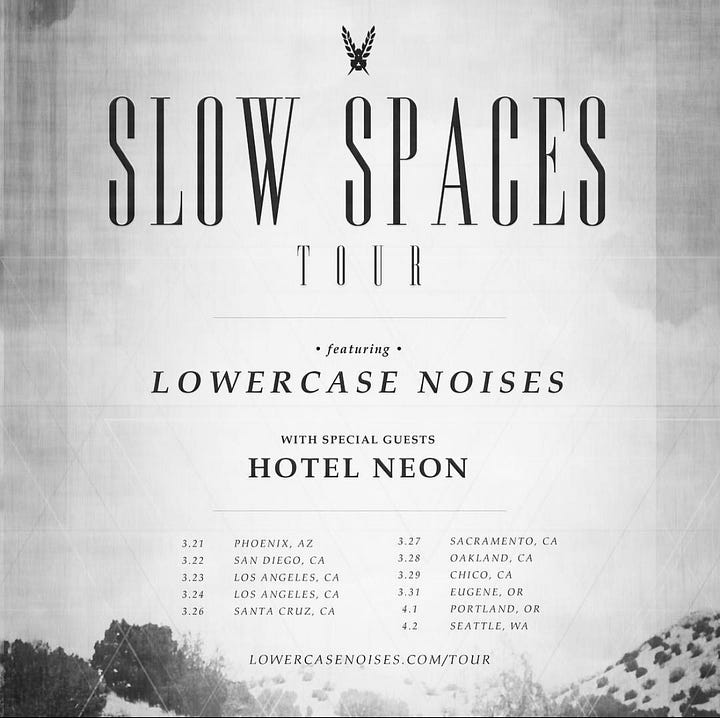
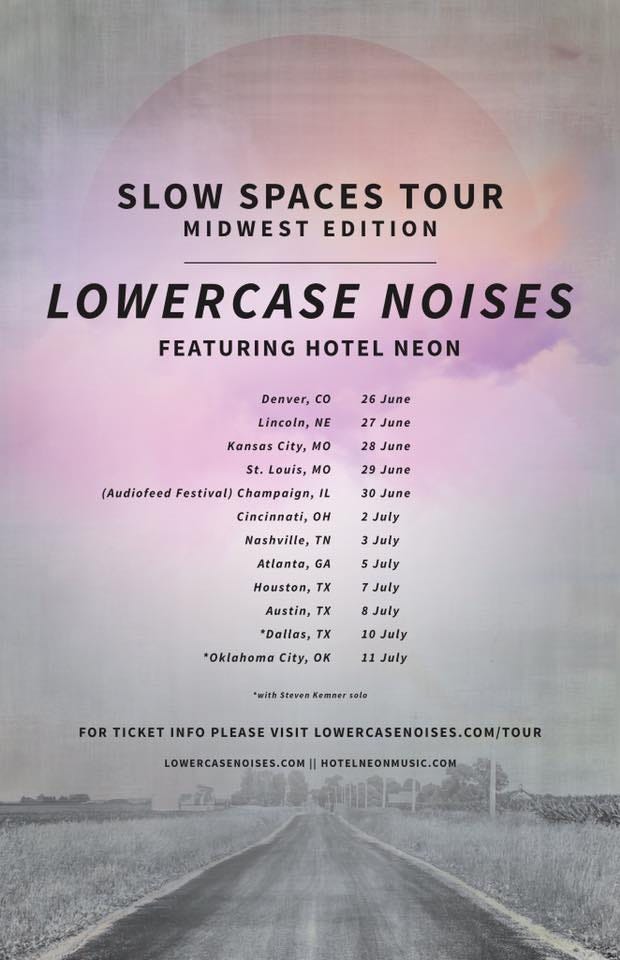
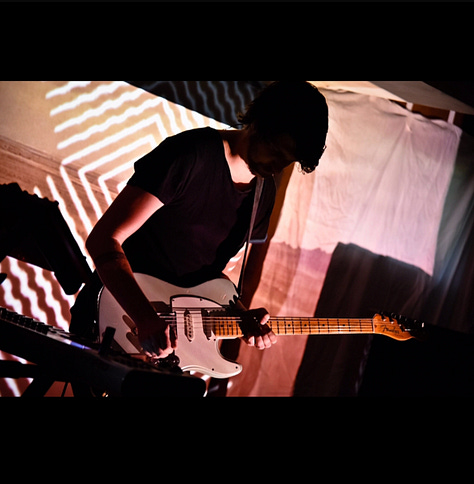
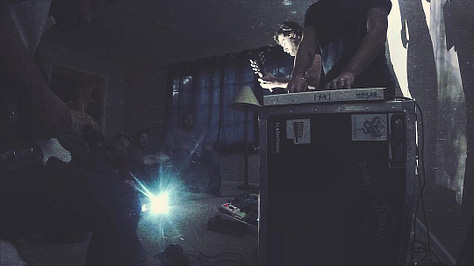
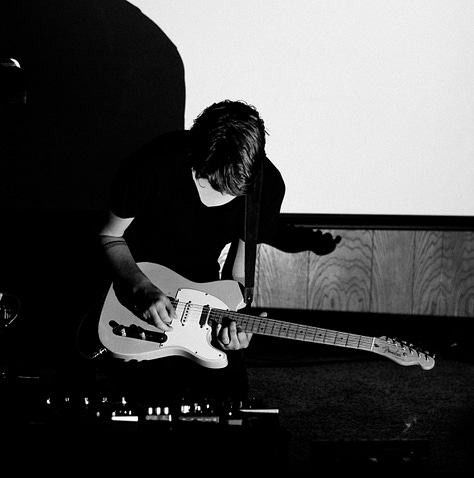
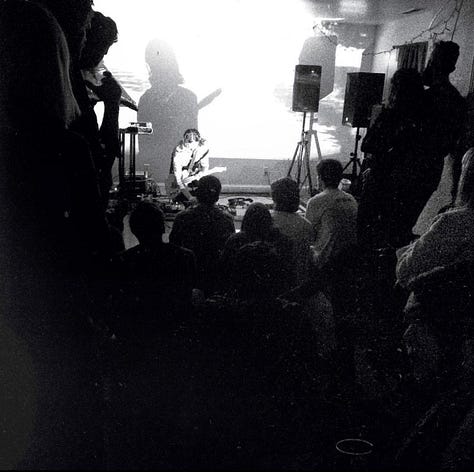

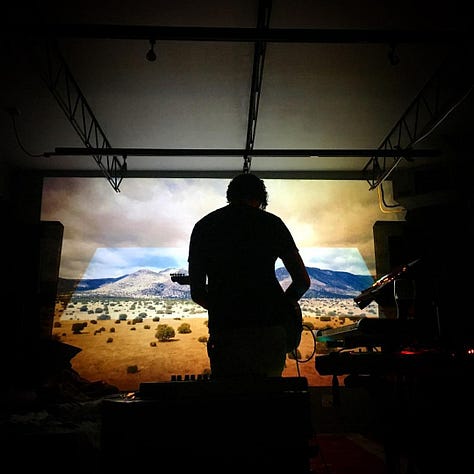
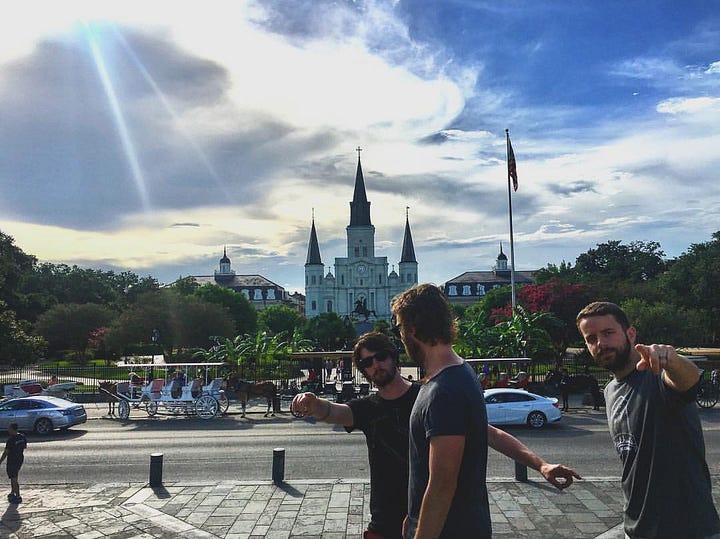

We did one tour up the West Coast, we did one through the Midwest, and it was intentionally eschewing traditional venues and “bar” types of spaces. We would walk into people's homes and play a show in the basement, but it was all extremely well thought through. There was an intake form where people could sign up to host these shows, and there were certain expectations for the hosts.
Andy: And I’d get pictures [of the space]. “Show us a picture, please, beforehand.”
Andrew: Yeah, and we had a PA ready to go and set up; a consistent set up to deploy at every one of these shows.
Andy: We didn't require anything of the hosts other than their house and an electrical outlet.
Andrew: Right, exactly. And I have a note on my thing here that I wanted to ask you about it, because I think back on those shows that we did, and I still, to this day, I think that was such a valuable experience, especially as some of the first tours that I ever did. All of the work that you did to manage all that, consolidate the PA system, all the mixing that was done remotely on an iPad in the back of the room, and we could do each other’s sets…it was like such a…as someone who loves process and efficiency and order, it just made my brain happy.
Andy: I feel the exact same about it. And that's another thing looking back, I'm like, it makes so much sense because the reason I even had the drive to set all that stuff up was because I was just like, “I know when I get out there, I'm not going to want to deal with anything like this.” Tour just wipes me out, and it still does, and I still love it…whatever. But it's just that I want to deal with as much as I can possibly think of. I want to remove any variables. So even before this, I’d played enough shows where you don't know what the sound system is like. And it's just like, “man, the way I come across, it’s only through the PA speakers. So if they're bad, it sounds bad, and I have zero control over that.” And that makes me, as the PDA guy, that makes me furious. So I'm able to be like, “hey, I've got a completely controlled audio/visual thing that I can bring into a place and not have to ask anything of them.” Because so many times people are like, “Oh, my God, I would love to just give you whatever you need, we'll do it, blah, blah, blah.” And you're like, “okay, well, I need PA, blah, blah, blah.” And they don't do it, or they don't understand what a good one is, or it's just…so just to figure out like, man…
And those whole tours only happened because of conversations that we had. It wasn't just me being like, “here, I've got this cool rig.” It was us being like, kind of collaboratively, “well, what would make sense? And how much can we share so that we don't have to bring two of a thing, you know?” And after that tour, you guys invested in the same gear so that, ultimately, when I went over to the east coast, I just loaded my Behringer XR-18 scene onto yours, and then it's good to go.
Andrew: Exactly. And yeah, we've simplified it since those days. We moved on from the XR-18 thing down to just a Motu Ultralite. And yeah, thankfully technology has gotten better so that connections are more stable, and things like that. But yeah, to your point, I mean, we took a lot from that. And actually, even to this day, the shows that we play are kind of built around that same setup, where we can reliably play a set regardless of the setting or the circumstance. As long as we've got a power strip to plug into, we can be relatively confident that it'll sound the same, but it's - well, not the same, but sound as good night after night.

Andy: And it's just wonderful to be able to to see a sound man light up when you're like, “no, I just got a stereo XLR for you. That's it.” And they're like, “do you need monitors? “And you're like, “no.” They're like, “this is awesome. I can do this, this is great.”
Andrew: Exactly. And so, I say all this; I bring up that story and talk about all this stuff because I do think that - and for those listening, you can't see this, but behind Andy in the shot here is his pedalboard behind him. And it is truly, like, a beautifully thought out instrument in and of itself. The matrix mixing that you do; you kind of talked about it with the process behind the latest album, where you wanted to focus on the processing: let a loop go, and then kind of shape that as the primary sound source.
So I don't want to ask too open of a question here, but I'm curious if you can talk us through how you've laid that out, at least in its current iteration, and how long did it take for you to go through that process? You just seem to have a very methodical, organized mind to think through…I mean, the live setup is one thing, this pedalboard is another. The way that you approach the technology and the equipment behind your music seems to just be so well thought out, and I'm curious how long it took you to get to that place.
Andy: Yeah. I mean, again, looking back on all this stuff, it's like…I thank you for saying that. I appreciate that. That's a nice thing to say, but I will say in response to that, like the organization and thought process behind these things is present in this space, but not in all spaces in my life. And that's because this is purely interest-based, because when I - still to this day, when I do this, and, you know, I've been talking to my wife and my therapist about this lately - what are the things that, when I'm doing it - I sound so insane to say this right now - but what are the things that make me not look at my phone, or just empty out my mind? What are the things that get me in the zone, or whatever you want to call it? And it's not a very long list at this time, for me, but still one of them is getting some loops in the looper, and just working with this system. And then being done when that part is done. The thing is, my input to it is even done once I press stop or stop recording. So to me, it's, it's like the best of all worlds.
But to get to the board itself, I still kind of see it as: I'm not doing guitar into pedalboard into amp and then into microphone into a DAW and then you mix it so it sounds good with all the other stuff. No; the pedal board is the DAW to me. And so, there are parts of the board where it is, honestly, more like a mix or mastering tool, so that the output at the end of this is the most finished sound you think it could possibly be.
So, a lot of things that have become really crucial to me are kind of, like, not exciting. The matrix mixer is kind of exotic, but I wouldn't say it's exciting at all, because as soon as you start describing to someone how you use it, or what you do with it, you know…I mean, my brain broke the first time I tried to use it and understand what I could do with it. Right? So, like, I get it. But then, like the Condor EQ, which is immediately after the matrix mixer: three parallel loops get summed together in the matrix mixer, and the first thing after it is a Condor EQ. So I can sweeten up the high end, I can cut some lows, and then cut out some mud in the middle. Like, that's what I use it for. And then it hits a compressor, which is to like…the compressor is there so if I got some resonant peaks, or something's getting a little too loud, it's a little contained. And then after that, we're going to master bus plugins, and now we're going stereo…get the stereo verbs and stuff. But that's kind of an overview of the process.
And, you know, over the years, it's funny…like, when you’re starting to use a looper pedal…at least I always started by putting it at the end of the chain. It's like, “of course, I'd want to record my sounds that I built and layer them, right?” That's what you want to do. But over over the years, I feel like I just kept moving my looper up. Well, one, adding more and different types of loopers to the setup, but two, moving the primary, “pristine” one from the end to the beginning, and now I see it as like, “this is ultimately a replacement for me.” I'm storing bits of myself [in the looper] and I like that. I have a sound. I can't really describe what it is, but I do have one, I think, and I like that. So if I can just throw a little bit of that into the looper and then it still comes through and sounds like me, that's really cool.
And that's, I guess, a more frictionless experience for me, in terms of ultimately getting at the core of the thing, which is: I'd like to play my guitar and have a good time, and enjoy what is coming back into my ears. That's the entirety of what I'm trying to accomplish there. And again, like I mentioned earlier, a lot of it is being like “yeah, I am the creator of this thing, but I'm also the audience of the thing.” I'm not really interested in a process where I'm not also part of the audience. And that's a weird requirement to have because one of my favorite things is just sitting back, and my brain is keyed into the sound, and I can be like, “that's happening because this thing and these 2 things are happening at the same time.” That's really interesting. And it satisfies my brain to the point where I'm hearing things I enjoy, I'm proud of what I'm hearing because it's me, and my brain is endlessly tracking the complicated things that are happening in this process here. That's one of those moments where I'm fully satisfied in my brain. And again, there’s a short list of things that do that.
Andrew: Yeah. In the recent shows that we've played together, you prop the board up in front of you. It's there like it's an instrument; it's like an integral part of the stage and all that. And there are definitely…I mean, there are moments during the show where you will quite literally just step back from it and let it go and do its thing. And I love that, as someone who feels huge anxiety to look like I'm doing stuff.
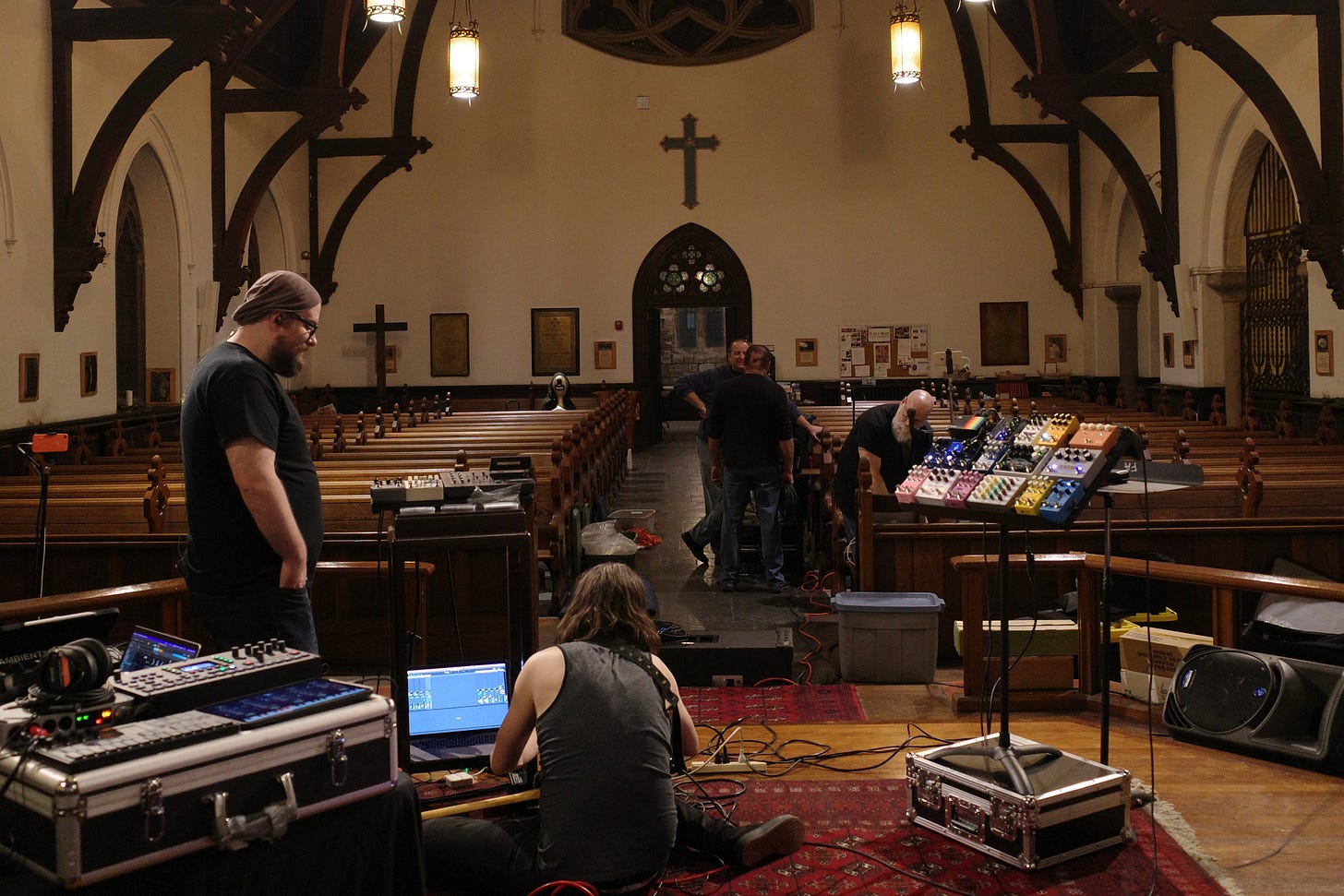
I think this is probably something that a lot of “electronic” or “ambient” musicians can relate to, you want to - especially when you're playing a show and there are people in front of you - you want to give the impression that, “no, I do have talent, and I am doing something here.” And it's hard to convey that a lot of the time. So it's nice to see you just embrace that role as a listener. If something sounds good and you've got it going, and you've shaped it into, like you say, something that sounds like you, I mean, there's no need to redirect that into something that it's not.
Andy: Well, and that's also the fun challenge of doing improvisational shows, is that really interesting tension where it's like, “who is creating the things here? We're all - literally 100 percent of us are in the audience right now, so what is happening? It's really weird, and it's not a cheap moment either. It's not like anyone is missing their cue or not doing their job. Everyone's doing their job, but no one's doing anything.
Even the most recent show we played, which was such an honor to play - The Gatherings - so Dave played with me, which was very, very fun. We got all this stuff set up and ready for the show, but we didn't rehearse for the show. We got to the point where we could have rehearsed, and I was like, “let's just not, because I don't want to.” We got to the point where we had the Ableton session set up, and we got our cues and whatever, and I just…I don't know, my brain was just like, “I think it would be more fun to just have it so that on stage is the first time we do this.” That was really cool.
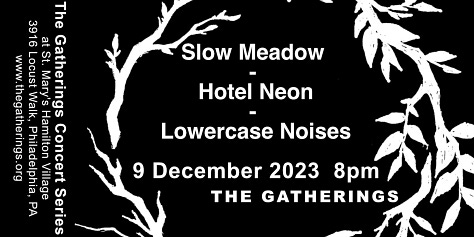

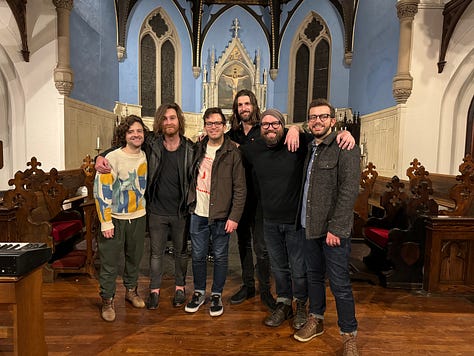
And I'm glad we did that. That went well. Next time, I want to challenge myself to pull back even more; that thing you're talking about is the thing I'm trying to do more of. And so, the way this whole setup facilitates me just sitting there and listening is emblematic of whatever the thing I'm chasing is, or trying to present.
Andrew: I mean, the show was amazing. It came off so well. And another train of thought that entered my head as you were talking there is that, you know, you're a solo performer as Andy Othling, as Lowercase Noises. You played the show with Dave, obviously, so you were a duo for that one. But I'm thinking, too, about how many people in our little sphere have a background playing with bands, playing with other people, and that role of the listener that we have to play. Sometimes we don't always have that opportunity as ambient noodlers in the studio. We're responsible for creating all the sound, and there's less of an opportunity to interact with other humans who are making noise.
Is that part of your influence at all? Do you have history performing with bands, and if so, do you find that that kind of informs the way that you are willing to step back and listen to the parts that your pedalboard is playing, for instance, and then respond to that? Is that part of the flow for you? Or does it not enter your mind?
Andy: That's an interesting question. It definitely does. It's just an interesting question because I remember so many times fighting with myself internally in band situations. Not about what I was playing, but kind of like, bummed about how I wasn't able to split my focus between the things we're talking about, because as the guy playing the guitar, I was so focused on that and whatever I need to do, and my tone and whatever, that I never could get into the thing that we're doing as a whole.
I have a background in some worship stuff, so there's some of that. But that's not the whole of it; even playing in other bands outside of the church or whatever, there's always been this weird internal thing where I end up disappointed in myself for not being able to fully enjoy those two aspects. But because of the way this stuff is set up and because of, I mean…I guess just the genre [of ambient music] itself, that's promoted. And I've said this a lot before: I had my different guitar playing periods. I had my blues rock period. I had my 80’s shredder period. I just got bored with all that. And, for whatever reason, this [ambient] stuff, I'm not bored. There's a big irony there, and I really enjoy that irony. I don't attempt to describe it. I just laugh at it; I think it’s fun. And I feel like a lot of us are there, you know? This is both the most meaningful thing I do, and completely worthless. And I think that's funny and cool.
Andrew: Yeah, totally agree. Do you consider yourself a guitarist? Is that how you would explain to people what you do?
Andy: Yes, because that's my starting point. It's like, as a 37 year old man, I just…I know how to play the guitar, and I know guitar pedals. That's just, like, what I got. So I…yeah, I'm a guitarist.
I would say that's my primary thing, but that doesn't tell the whole picture, for sure, because yeah, there's even this whole other aspect where you know, my technological and computer science background is all coming back around now, and I'm finding myself being like, “man, I thought I would never deal with this crap again, even though I got - this was my degree;” there was a part of me that's like, “man, I'm never going to do that shit anymore.” But now I'm coming back around to it from a pure interest point, and it's just, it's me laughing at myself. It would be funny to go back and tell [myself] like, “nah, man, you're going to be looking up Max for Live stuff and learning the visual programming language. And you're going to wonder how to do if-L statements in this thing that you have to learn. It's going to come back.”
Andrew: You hit on a point I wanted to ask about, so I'm going to go there now, but you've mentioned Max for Live. I know you've done some work for Chase Bliss, setting up devices for control of their pedals.

I know you do a little bit of work with Old Blood [Noise Endeavors] too; I don't know if it's quite as technical as that. But it just seems like you have kind of a valuable skillset for those companies, to be working with people like you. It seems like you would have good perspective, and [give them] opportunities to bounce ideas off of you from the perspective of both a guitar player, as well as someone who plays the guitar in a “not normal” way, and also as someone who's interested in technology and is fluent in technology, as well.
So, yeah, do you think there's going to be more opportunities for you like that going forward? Obviously, if you're not at liberty to discuss anything…
Andy: Yeah. I mean, I think the answer is yes. The trajectory is just like, it'd be silly to say no. And, you know, to be clear, I am on retainer with Old Blood Noise, which was very cool, and I'm very thankful for it. And that just means I get a certain amount of money every month and it means I'm available to them for whatever they would want in these areas. So, a lot of it means I'm just like, in their Slack server, and I have a whole thread called “Andy's idea hole” in there, which is just like…I have an idea, and I just throw it in there.
And it's not like…you know, I'm not a real employee. It's not like, “here's the thing to work on now.” It's just like, “if any of this is interesting to you as a company, here's a crazy idea.” And I don't have any of the baggage…I say all the time with them, I don't know how much stuff costs. I don't know what is realistic in manufacturing, I don't know about parts and whatever. I don't know about the electronic hardware that makes pedals work. I don't know. My brain doesn't really care about that. But I know and care about everything else around it.
Andrew: It's like the dream job. You're like a consultant, basically. A creative consultant.
Andy: Yeah. Exactly. And, you know, I have been hesitant over the years, because these people became my really good friends first. So I've been really reluctant to partner with them in a business sense, so that it doesn't sour…
Andrew: Money ruins everything.
Andy: Yes. I was specifically…Brady Smith at Old Blood, and Joel at Chase Bliss, these two people are my friends, and I've told them many times if something comes up in a business thing, I'm out of it, because I value the relationship more. Because of that, I've always tried to like…I don't want to be full time. I don't want either of these friends of mine to be my actual boss.
But I do…like what you said, they seem to value my input for those reasons that you mentioned, because I play and because I can at least fathom all the concepts that are going into a pedal to a level that other people may not. And even just from like a UI standpoint, like “what can you do with controls on the face of a little box?” I've had enough experience now where I'm like, a lot of people just think you can do anything, or don't think through some UI choice, and like switches and whatnot. There's all these really interesting limitations in this industry that aren't the musical ones that I enjoy hearing about from the company.
But I also enjoy not being the one in charge of solving that problem. Like you said, I like being the idea guy who’s like, “you know, you can just completely ignore what I said. That's fine. You could run with it; that's fine. You do a little piece of it, and it's not going to hurt my feelings. Because again, I don't know how stuff works. I don't know supply chain. I don't know cost of this.” I just…I come into it as kind of a dumb guy, where I'll be like, “what if you just put another slider on there?” And they're like, “ah, well, we can't.” I’m the guy asking for the one tweak, and they're like, “dude, we'd have to push it back eight months for that.” I'm like, “oh, okay. Well, I didn't know.” That's kind of where I'm at with that.
Andrew: I was listening to the most recent episode of Object Worship with Eric [Nyffeler], art director for Chase Bliss, and the way he was describing the problem of - like you were just talking about - what do you put on a label? How do you direct people's attention to the functionality of the pedal in a smart way, in an efficient way? It seems like you would be excellent input to that process. Kind of shaping the decisions that happen there.
Andy: Yeah, and I feel like I'm good when there's something that already exists. “Hey, could you try this out and let me know what feels off?” I feel like that's where…if it's from a blank piece of paper, I don't know what I have for that, you know?
But, for example…and I can talk about this [because] Brady [Smith of OBNE] has talked openly about this. One of the things I'm beta testing right now for, Old Blood Noise is this new triple expression ramper. They'd already put one out a couple of years ago, but this one is much more full featured, like sync-able or unsynced, and tap in and out; all these features that everyone has always wanted, like momentary actions that I always wanted from the ramp. They were kind of at a stopping point with it, because Dan had sent over the prototype to the shop and no one knew how to test it. Like, no one had a use case for it. They kind of realized, like, “who do we have that's going to even want to go through all the features of this?”
That was right at the point where I came on board more officially, and the first thing that they sent me was this. And I did the thing where I was like, “whew, okay, here's way too many ideas - and I know that - of things you could change and add to this.” And I did have to follow up later to be like, “Dan, by the way, I’m not precious about literally anything here. I’m not considering many of the things that need to be considered, so I’m assuming a lot of this will be crossed off.” And he was like, “okay, good. Thanks. I didn't want to have to be the guy to always say no.” I'm just like, “I don't care. I don't want to be in charge of that. And I don't want to have all my eggs in that basket.” So it's kind of nice for me. But yeah, I put a bunch of stuff in Slack and they're like, “oh, yeah, we could do these couple of things that make sense.” And we'll do that.
I didn't have to start from zero for anything. I just got to go away, be way over the top, and know that whatever they chose to add to the products hopefully makes it better and more enjoyable for people to use. That’s all.
Andrew: That's awesome. Yeah, it sounds so cool. I definitely wanted to dig into that a little bit and get your perspective on how you've been working with those guys, because it seems like kind of a perfect match for what you do.
Andy: Yeah. And Old Blood Noise is fun because they they have a lot of stuff they want to do in the future, so there's a lot of…they're very responsive to the sort of like, bigger ideas, you know? A lot of stuff I come to is in the vein of like, “hey, there's this whole group of people and we're not using pedals on the floor anymore.” A matrix mixer is like the nail in that coffin - I can't use this shit on the floor with my feet. So, what does that mean for pedal creators? What can you make if you let go of the use case of a foot smashing the top of it? like, I think there's a lot you can do, you know?
Andrew: There is a lot.
Andy: Yeah, that's like my interest, even in the industry as a whole is like…I don't know. I see this weird…maybe it's not a big niche, I don't know, but like, it's definitely a niche that no one's really doing anything specifically for.
Andrew: I think there's a lot of opportunity for it, and especially because, as more of a synth player…well I obviously have a history with bass guitar, and I used to smash pedals with my feet. But I mean, I think these days, at least in the circles that I know, I know more people using pedals with synthesizers than I do with guitars. I think there's a huge desktop…
Andy: Or like outboard for their DAW.
Andrew: Exactly. Yeah. And especially now when you talk about like your eurorack and modular crossover, too, it seems like a pretty ripe opportunity. We'll see.
Andy: Yeah. It's fun to be at the - I don't know, maybe the forefront of something; just to be throwing those ideas out there. Pretty fun.
Andrew: So I'm going to throw a curve ball and take us out of the music gear conversation and focus on where you are right now. You're in Albuquerque. One of the jokes that you always share is that you hate how bands will skip over Albuquerque and jump over to Phoenix, or go up to Denver, or something like that.
Andy: “Phoenix, day off, Dallas.” Oh, cool. Well, I know where you are that day, right?
Andrew: All the “Breaking Bad” jokes, and stuff like that…but yeah, I'm interested to know, because I've talked about this with Matt Kidd, our mutual friend, in the past: the music that you make kind of suits the environment. You think about Albuquerque, and you really have to go there to see it and get a sense of the vastness of the desert.
And so when you do visit a place like that, I do think it makes a lot of sense that you would make the kind of music that you make. I'm curious to hear you talk about your geographic location, and if it affects at all the way that you make your music, or if it has any kind of influence on the sounds that you're producing. Because if I were to pluck you out of Albuquerque and then place you in New York City, for instance, would that sound still be the same? Or would you be approaching your music the same way?
Andy: Yeah. I mean, the obvious answer is it absolutely affects it. I've lived here since I was in second grade, so that was 1992 that my family moved to Albuquerque. It's been a long time. Matt does - he loves to mention that I sound like New Mexico, and it's just interesting because I don't have as much of a grasp on that, because it's been so long and because I do really like it here. I've never been one of those people who like, “oh, man, I'm just itching to get out of the old hometown.” As much as I travel, I'm always like, “man, it's great to visit all these places, but I’m looking forward to going home.”
But yeah, the high desert - so the other thing I always say to people is, yeah, Denver is the “mile high city” but Albuquerque is too. It's the same elevation. It is very nice: even though we are a Southern state, the climate's very nice, very dry. We are huge babies about any humidity at all. But, you're completely right. Albuquerque is the biggest city here, by far, but the other thing I always say about it is, pretty much from any point in the city, if you drive 45 minutes in any direction, you are literally in the middle of nowhere. You can't see the city. You can see mountains in the distance, but nothing - and literally, I'm not making that up - in any direction. There are some suburb kind of things, but it goes away very quickly, and there's just…I mean, Breaking Bad did a good job of portraying what it looks like here, that kind of vastness, but I do feel like the landscape and the vibe here is a thing that I hold on to. I do need to be here. I need that space. I've always enjoyed art that makes me feel small.
My mom is a painter, a pastel artist, and looking through her art books, I was always in love with the Romantic period. It's just massive, massive landscapes and a tiny person right there. The point is to feel [small], and learning that a lot of people are like, “ah, that makes me feel really uncomfortable…” I'm like, “that's interesting. That fills me with…it feels like I'm calming down a little bit, to feel like the tiny little speck, you know?” And I think Albuquerque gives that to me on a real level. Earlier you were asking about what direction the wall Dave is on versus me in this room, and I had to be like, “the mountains are that way, so this is north.” The mountains are just this thing that's never leaving your sight. You can see it from all points of the city because of the desert. There's no obstructing rolling hills or trees. It's just this massive mountain range. In 2020, we moved from outside of the city, in the mountains, to right in the city. It's really cool because we're a 5 minute bike ride from the Rio Grande river, so we're in 1 of the small, greener areas. But I mean, that's just this little sliver [of green] near the river, and everything else is that expansive desert.
And yeah, you know, I feel like someone like you or Matt could probably speak better to how that affects my music. I feel like I can only speak to it being absolutely essential to me. And yeah, I can't imagine being in Brooklyn trying to do anything. To be honest, I would just…I don't know. Visiting New York and Brooklyn is so fun, but that is another world.
Andrew: I mean, out here on the East Coast - you talked about how you've got mountains visible; we have skyscrapers visible from every direction. And it's just like…not quite the same.
Andy: Yeah, see, we can't get our buildings that high. Because it's like, “are you sure you don't want to expand outward first? You can go outward as far as you want.” We don't need to go up.
Andrew: Yeah, right. Exactly. I guess too, it's just kind of refreshing to hear someone speak about writing music in their home, in their hometown, and not like…because I guess there's like this romantic ideal of, you know, the small town musician leaves and goes to the big city, like New York and LA, and then they write retroactively about their hometown and they talk about the influence that it had on them, and all that stuff. But you're, like…you're there, and you're in it, and you're happy. I don't know, it's just kind of nice to hear about that for a change. And like you say, it is an integral part of you, because it's just where you are. I just find that kind of fascinating. I like knowing about people's context and location and geography, and things like that.
Andy: I feel like a loser for saying talking about my home and my interest rate that I got, but like…I swear to God, if I'm wanting a little pick me up or something, I'll go look at Zillow and see how much value my home has gained since 2020. That's a thing that will always lift my spirits. I feel like an asshole for bringing this up, but like, I'm not lying when I say I'm at the point in my life, as a 36 year old [pause] whatever. I think I’m almost…
Andrew: I told someone that I was the wrong age the other day. I still don't know how old I am.
Andy: Nice. Yeah. Late thirties. I've purchased my home, I want to stay here. We got a 30 year mortgage and I'm like, “sweet. Sounds good.” I'm happy to be here for that amount of time.
Andrew: That's a rare thing.
Andy: And I'm doing what I want, ostensibly. I tell people often, all I want from life is to keep doing the thing. I don't have any crazy big dreams or goals anymore. I'd love to redo my bathroom, but I can't think crazier than that. I don't even want more gear. The space that I'm in, I don't want it to be bigger, because I know that would be more stressful for me. The space I was previously in, I paid to build out, and it was a very big two room setup, and I prefer where I'm at now, in just a single room.
Andrew: I mean, that's the PDA, right?
Andy: Totally. Absolutely, but it feels insane to be able to say there's not a ton of functional difference between me and a retired guy. I just have to keep…every day I wake up and be like, what do I want to do today? And I'm the only one who gets to answer that question. I have a little more to think about than the retiree, but I will take those chances. I'll deal with it.
Andrew: I mean, there's a lot of, to me…I said this in my interview with Tom, we were - Tom Meluch, Benoît Pioulard - we were talking about his very simple setup, and just like, you know, “this is what I use and this is what I do, and I'm at peace with that.” And there's a lot of freedom that comes when you accept the fact that “this is who I am.” And I don't think enough people are ready to do that or willing to do that.
Andy: Yeah, and again, that's…I've been going to therapy for almost five years now, and this is all tied into that. Again, looking back at the PDA thing, I have a drive to need to know the “why” for everything. You think of a toddler just asking “why,” that's literally what I'm doing for every action.
I'm paying taxes. Well, why? What is happening with them? I care about what happened. Theological things or business things, like the people I'm working with: “Why are you making money? Like why?” And it's not like I'm having these conversations directly. It's stuff I glean, or I'm in this group because I see that they care about the “why.” There's a bigger picture thing involved, more than just a capitalist “line go up” situation. I'm watching these people wrestle with how to treat their employees better versus the bottom line of the money. I respect it. It sounds like a nightmare to me, like Jesus Christ.
I don't really know why I got off on this tangent, but…
Andrew: No, I love it though. Because I think it's actually…it kind of hammers home why I think we get along so well, because I personally, again, going back to that, “process” thing, that's literally what I'm paid to do in my day job. And that's why I…I am sort of ashamed to admit it, but I kind of like my job because I am paid to ask “why” to everyone I meet: “why are you doing things this way? And what is the purpose of doing it this way? And how can it be done better, or how can we get to a better place with this?”
So I don't know. I think it's instructive. I think it's good to step back and think about how you approach things, because I also think that comes through in your music too, and even your equipment choices, like “why am I bothering with things I don't like or weigh me down? I'm just going to focus on - I'm a pedal guy. I'm okay with that. I'm just gonna go with it.”
Andy: Yeah. And I've even another thing I've had to have myself be okay with is like, not only am I a pedal guy, but like that, that shit's going to be changing for the rest of my life. There is no end point. So many guitarists I look up to are like, yeah…like Tom Morello has nine different versions of the same pedalboard across the country, so he doesn't have to [change or travel with it].
I'm just not going to be like that, you know? I'm not going to have “the Andy Othling pedalboard” or whatever. So, it's just embracing that thing, the entirety of change in the whole thing.
Andrew: Exactly. Well, how about I ask you one more question here while I've got you. What's the next creative frontier for you at this point? Like, do you…
Andy: I have such a good answer to this.
Andrew: I love it. Let's hear it. Jump right in.
Andy: Yeah, well, it's been so fun…I feel like it's probably been the last year and a half, maybe, I've gotten back into… I mean, “back into,” I don't know. I've always struggled in school. I got very good grades, but I always just felt the tension of like, “I hate people telling me what to do.” And that's all school is, right? But I'm coming back around to be like, “oh, now, here's something I want to learn.” And I have the drive to go learn it.
So, we talked about Max for Live a little bit, Max MSP. That's just visual coding language that, once it kind of clicked with me, I was like, “I like this concept of, of visual coding in general.” I understand the text programming part, but now that kind of workflow makes sense to my brain. I actually really like that a lot.
So, Max for Live has - or Max MSP - has a lot of cool stuff that I've primarily used for MIDI control of other things, like the plugins you mentioned that I have done for Chase Bliss are MIDI controller plugins of their pedals, and alongside that, I mean…you're aware of my interest in a visual element for some of this stuff for live performances. I'd like to provide something else to look at other than me hunched over a keyboard.
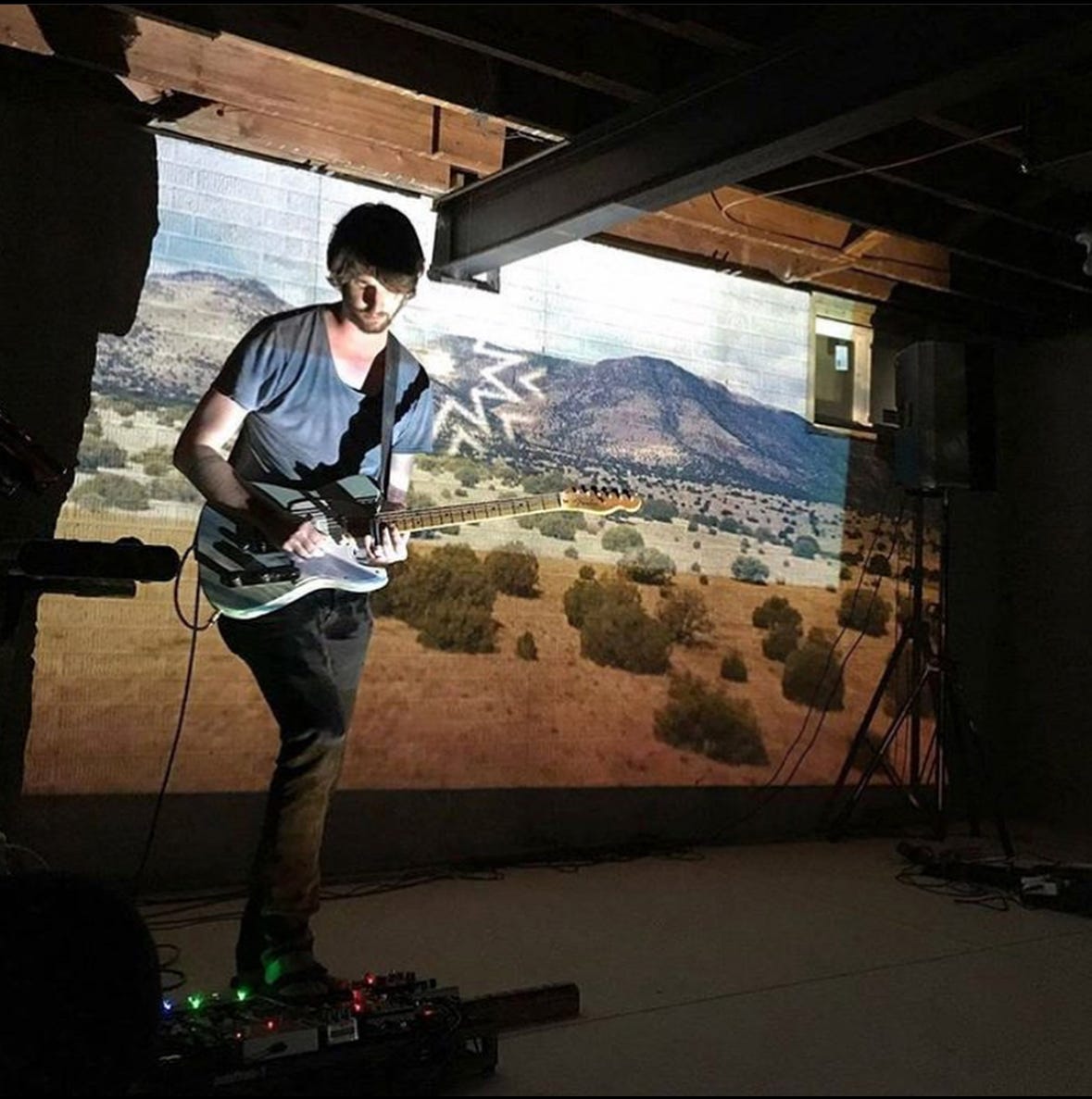
I'm also just very interested in that in and of itself. So, long story short is that I've been slowly learning this visual programming language in the software called Touch Designer. So it's like, visual programming, but for video stuff.
Andrew: Is that at all related to OSC? Am I thinking of something different?
Andy: I think it's different. No, this is more like a straight up…I mean, I don't even know how you describe it, but it's a real-time video processing - modular video processing - software. And again, I'm still learning because I don't know all the stuff that goes into visuals and graphics. There's a lot there that's new to me, but at the core of it, once I understood about the software and saw how it was similar to Max MSP and like, “Oh, you want a circle?” Well, you get the circle object and you drag it to the other object. It's like “whoa, it's that easy. That's great.”
The thing I've been doing with it is, you know, I have this use case in my head where we're talking about this generative music thing, with which I feel satisfied at the moment [in terms of] my abilities. I'm not experimenting in that realm at this time. I'm just enjoying. So this video realm is more where I've shifted my experimenting. And so, literally tomorrow morning, I'm being delivered a projector mount, so I'm going to mount my projector so it projects directly on my pedalboard and the back wall, with the goal of coming up with…using the same processes that we've been talking about, and I've been using for years, but in this other realm to be like, “I'm dynamically lighting up things on the pedal board. I've projection mapped each pedal, so when they do a thing, it physically lights up - the whole thing does - because it's projection mapped.” Or just doing - there's a lot of people just straight up doing generative art in this software, [generating] some noise layers and [warping] them and [displacing] them like this, and now we've got this cool rotating random sphere with a cool texture on it.
That hits a lot of buttons for me, so that's where my interest is at the moment. So I feel like I'm…the problem I'm currently trying to solve is, how can I present these generative ambient pieces visually, without being like, “nah, that's boring.” And that's personally - because I can set up a camera and film the pedalboard, and be like, “it's making this right now.” That's not enough for me. My brain is left unsatisfied with that. So this is my attempt to - and again, the end of this process will be, I just press ‘go’ and film a video, and there will be no post processing. This is all real-time, generative. I could have reactive [elements] based on audio stuff, of course. So, yeah, it's just me, based on what I now know about myself, being able to look at this thing and say, “that hits all these boxes. I want to know this.” I'd be excited about how to leverage it in literally everything else I do: for the live shows, and it would be sick for creating videos on YouTube, which I'm trying to get back to.
I feel like my brain has this threshold of “if you want to get back on there, it's got to be a certain level of…” and I don't even have the criteria for what the level is. It's just like, I know that I'm unsatisfied with my current ideas. So I'm seeing what I'm interested in. I'm trying to learn it.
Andrew: Yeah, I can definitely see the potential there, and it does make sense. Again, for the uninitiated, if you see Andy play a show, there are audio - there are projected video elements of the show that do react to the audio that he's playing, and it's a very…
Andy: I feel like every show I've done with you, there's been some aspect of that, even when it was completely made up or completely to tracks.
Andrew: It tracks perfectly that that would be an area of interest for you, because I think you've been ahead of the game in thinking about that, at least compared to most people that I see in this space. People will just throw up stock footage or a looping layer, or something like that. But there are really creative ways, especially in this space, the more experimental ambient realm, that video can really enhance a show, making it a true audio/visual type of experience.
Andy: I would like to be able to say…not that I'm a jack of all trades, I guess, but that I took the video thing seriously. And you know, I have a certain level - like when I play shows, I don't…and again, I can't really verbalize what exactly the threshold is, other than I will know when it feels good enough, but I want to be able, as much as possible, to - when my brain does say, “here's a physical, actual, technical thing we'd like to achieve,” that then I can do it, because my PDA brain will come up with a lot of [counter arguments.] “Here's what we want to do,” but then I'll rebel against myself. It's like, “well, you want to do that? It's going to require a little bit of actual work. Do you want to do that?” And then my brain will be like, “yes, we actually want to do this so bad that we will learn something. That is acceptable at this time.” That's how I feel like; I've learned how my brain works. I'm working with it rather than against it. I'm not trying to beat my brain into submission and be like, “we need to figure out how to sit down for an hour and write songs every day.” I'm going the exact opposite direction and saying, “all right, what do you want? What do you want to do? What's going to make you stop yelling or whatever? And let's just do it.” And that's kind of the whole thought process.
Andrew: Oh, man. I wish…God, we'll have to do a part two, because there's like a thousand other things I want to ask you based on what you've been saying. But I only have so much time.
Andy: I’m down.
Andrew: Yeah, maybe we'll we'll do that. We'll have to do a follow up at some point. But this has been…
Andy: Please. Yeah. I mean, on the podcast I do, we talk a lot behind the scenes of like, “wow, can we have people back on?” And I'm just, I'm a huge proponent of just “let people get back on there.” Who cares?
Andrew: Nobody cares. Nobody cares. Yeah, I'm all for it. This triggered a lot of thoughts, and it was really mentally stimulating to think about. I have a lot of notes that I took on the side here, so we'll definitely have to do a follow up session, I think.
Andy: If I could just say one…
Andrew: I was about to say, before we hang up here, please say whatever you want. Plug whatever you want. Do your thing.
Andy: All I wanna say is, I just wanna make sure people think about falling out of a coconut tree. I want people to think about how many of them don't even understand that we exist in the context of all in which we live and all that came before us. So that's what I wanted to end with.
Andrew: Beautifully, beautifully stated. And that gives me a perfect excuse to plug a coconut tree meme into the Substack article that will follow here. Thank you for doing that.
All right, Andy. Thanks.
Essential coconut tree reading: https://knowyourmeme.com/memes/fell-out-of-a-coconut-tree




